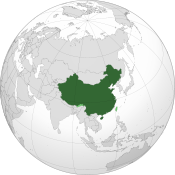Hong Kong Democratic Party stirs up universal suffrage reform package controversy
Wednesday, June 23, 2010
The Democratic Party has been stirring up some controversy by proposing a revision of the 2012 constitutional package regarding the universal suffrage in Hong Kong, which the local government as well as the National People's Congress, accepted. The Legislative Council (LegCo) lawmakers are scheduled to cast their ballots tomorrow to decide whether or not the proposal will be accepted, and it is highly likely that the proposal will be approved.
Yesterday night, the Democratic Party held a long meeting to debate on the controversial issue. After five hours, consensus aroused in the Party to accept the package, with only 63 opposed to the LegCo part of the proposal and 71 to the Chief Executive part, as compared to 246 and 237 in support of the LegCo and Chief Executive parts respectively. "The decision is not just a historical one for the Democratic Party, but also a milestone for the city's progress in democracy," said the Party chairman Albert Ho.
Under the new revision, ten constituencies would be added to the original 60 of the LegCo, five of which are functional constituencies and would be voted by elected district councilors. Those who are not elected will not be permitted to vote. This allows the people to indirectly participate in the election.
The vice president of China, Xi Jinping had approved the amended proposal in order to prevent Hong Kong's political situation from worsening. The Executive Council also approved the proposal, and the Chief Executive of Hong Kong, Donald Tsang said there is a 'ray of hope' for the democratic development of Hong Kong as a result. The decision broke the stalemate between the government and the Democratic Party. According to Ming Pao, the decision also improved the chances of Xi Jinping's becoming the next president.
The proposal is also popular among the Pro-Beijing political parties, such as the DAB, Federation of Trade Unions, and Liberal Party. Politicians Elsie Leung, Rita Fan and Tsang Hin-chi also support the proposal, the former stating that the proposal was 'worthy of consideration'.
However, the proposal received heavy criticism among radical democrats, including the League of Social Democrats (LSD) and the Civic Party, as well as the general public. The LSD met outside the Causeway Bay branch of the Professional Teachers' Union, where the Democratic Party's meeting was held, to protest. They stepped onto a roasted pigeon, symbolising the Democratic Party as the Party's logo included a dove. They waved placards with the names of seven of the party's lawmakers and condemned them for being "democracy sinners." The Party had also protested when Ho participated in the City Forum and during a meeting of the Alliance for Universal Suffrage.
During the City Forum, where Ho, Audrey Eu of the Civic Party and a National People's Congress representative talked, LSD members frequently booed and attacked Ho. Even after Franklin Wong rescued Ho and put him in his car, some 'Brothers of Victoria Park' still surrounded the car, and police officers had to protect Ho so that he could leave. During the above mentioned meeting, many people claiming to be previous supporters of the Democratic Party accused the Party of betraying them, including a 80-year-old man called Chan, a 31-year-old named Cheung and an unnamed middle-aged woman.
These actions were condemned by Democratic Party members, including Szeto Wah, Emily Lau, and Cheung Man-kwong. Ho said that, 'when extreme leftists and rightists attack you, you know that are in the right track'.
However, not all Democratic Party members supported the proposal. Martin Lee, the founder of the Democratic Party, had earlier vowed to leave the party should the package be backed. He stated that he was bitterly disappointed, and needed two weeks' time to consider whether he should quit or not. Party member Andrew Cheng also opposed the proposal, as did James To. The former is thinking of leaving the party.
Ho says he will try to persuade the two to support the package in private. It has been predicted that once Lee and Cheng leave the party, around 20 members will follow their lead, putting the unity of the party at stake and leaving the party to face its greatest danger since 2000.
Sources
- Commercial Radio Hong Kong. "梁愛詩指民主黨的區議會改良方案可以考慮" — Yahoo! News, June 17, 2010 (Traditional Chinese)
- Sing Tao Daily. "社民連踩場追擊民主黨" — Yahoo! News, June 21, 2010 (Traditional Chinese)
- Ming Pao. "粉絲罵民主黨 嬲到入醫院" — Yahoo! News, June 21, 2010 (Traditional Chinese)
- Colleen Lee and Phila Siu. "Democrats fight Judas label" — The Standard, June 21, 2010
- Ming Pao. "民主黨高票撐 區會方案勢通過 鄭家富醞釀退黨 李柱銘稱考慮兩周" — Yahoo! News, June 22, 2010 (Traditional Chinese)
- Ming Pao. "李鄭一旦退黨 料近20人追隨" — Yahoo! News, June 22, 2010(Traditional Chinese)
- Ming Pao. "中央妥協 免政局激化失控 助下任特首拆彈 分析指習近平拍板增威望" — Yahoo! News, June 22, 2010} (Traditional Chinese)
- Ming Pao. "曾蔭權「讚過龍」 民主黨被誤棄終極普選" — Yahoo! News, June 22, 2010 (Traditional Chinese)
- Commercial Radio Hong Kong. "曾憲梓指區議會方案得中央認同" — Yahoo! News, June 22, 2010 (Traditional Chinese)
- Colleen Lee, Beatrice Siu and Thomas Yau. "Democrats vote yes" — The Standard, June 22, 2010
- Sing Tao Daily. "何俊仁私下爭取鄭涂支持方案" — Yahoo! News, June 22, 2010 (Traditional Chinese)
- Commercial Radio Hong Kong. "民主黨大會表決接納區議會改良方案" — Yahoo! News, June 22, 2010(Traditional Chinese)
- Commercial Radio Hong Kong. "民主黨大會大比數票表決接納區議會改良方案" — Yahoo! News, June 22, 2010(Traditional Chinese)
- Colleen Lee. "Chief sees democratic 'ray of hope' with Legco vote likely in the bag" — The Standard, June 22, 2010
- "范太籲反對派尊重主流民意" — Ta Kung Pao, June 22, 2010 (Traditional Chinese)
- "公民黨堅持否決政改方案" — Ta Kung Pao, June 22, 2010 (Traditional Chinese)
- 李雨. "「區議會方案」的關鍵" — Hong Kong Political, Economic and Cultural Society, (Traditional Chinese)

